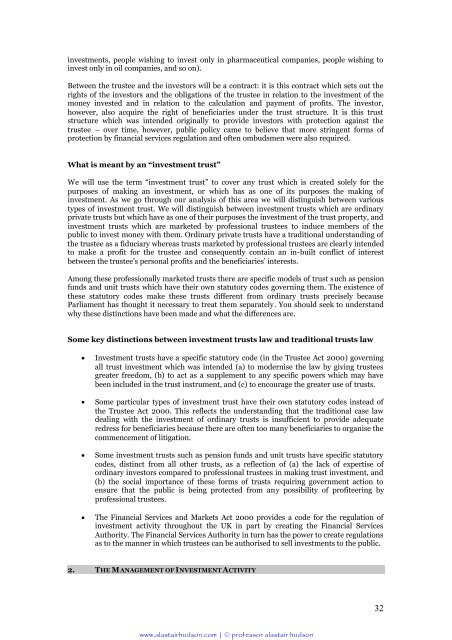Advanced Equity and Trusts Law - alastairhudson.com
Advanced Equity and Trusts Law - alastairhudson.com
Advanced Equity and Trusts Law - alastairhudson.com
You also want an ePaper? Increase the reach of your titles
YUMPU automatically turns print PDFs into web optimized ePapers that Google loves.
investments, people wishing to invest only in pharmaceutical <strong>com</strong>panies, people wishing to<br />
invest only in oil <strong>com</strong>panies, <strong>and</strong> so on).<br />
Between the trustee <strong>and</strong> the investors will be a contract: it is this contract which sets out the<br />
rights of the investors <strong>and</strong> the obligations of the trustee in relation to the investment of the<br />
money invested <strong>and</strong> in relation to the calculation <strong>and</strong> payment of profits. The investor,<br />
however, also acquire the right of beneficiaries under the trust structure. It is this trust<br />
structure which was intended originally to provide investors with protection against the<br />
trustee – over time, however, public policy came to believe that more stringent forms of<br />
protection by financial services regulation <strong>and</strong> often ombudsmen were also required.<br />
What is meant by an “investment trust”<br />
We will use the term “investment trust” to cover any trust which is created solely for the<br />
purposes of making an investment, or which has as one of its purposes the making of<br />
investment. As we go through our analysis of this area we will distinguish between various<br />
types of investment trust. We will distinguish between investment trusts which are ordinary<br />
private trusts but which have as one of their purposes the investment of the trust property, <strong>and</strong><br />
investment trusts which are marketed by professional trustees to induce members of the<br />
public to invest money with them. Ordinary private trusts have a traditional underst<strong>and</strong>ing of<br />
the trustee as a fiduciary whereas trusts marketed by professional trustees are clearly intended<br />
to make a profit for the trustee <strong>and</strong> consequently contain an in-built conflict of interest<br />
between the trustee’s personal profits <strong>and</strong> the beneficiaries’ interests.<br />
Among these professionally marketed trusts there are specific models of trust such as pension<br />
funds <strong>and</strong> unit trusts which have their own statutory codes governing them. The existence of<br />
these statutory codes make these trusts different from ordinary trusts precisely because<br />
Parliament has thought it necessary to treat them separately. You should seek to underst<strong>and</strong><br />
why these distinctions have been made <strong>and</strong> what the differences are.<br />
Some key distinctions between investment trusts law <strong>and</strong> traditional trusts law<br />
� Investment trusts have a specific statutory code (in the Trustee Act 2000) governing<br />
all trust investment which was intended (a) to modernise the law by giving trustees<br />
greater freedom, (b) to act as a supplement to any specific powers which may have<br />
been included in the trust instrument, <strong>and</strong> (c) to encourage the greater use of trusts.<br />
� Some particular types of investment trust have their own statutory codes instead of<br />
the Trustee Act 2000. This reflects the underst<strong>and</strong>ing that the traditional case law<br />
dealing with the investment of ordinary trusts is insufficient to provide adequate<br />
redress for beneficiaries because there are often too many beneficiaries to organise the<br />
<strong>com</strong>mencement of litigation.<br />
� Some investment trusts such as pension funds <strong>and</strong> unit trusts have specific statutory<br />
codes, distinct from all other trusts, as a reflection of (a) the lack of expertise of<br />
ordinary investors <strong>com</strong>pared to professional trustees in making trust investment, <strong>and</strong><br />
(b) the social importance of these forms of trusts requiring government action to<br />
ensure that the public is being protected from any possibility of profiteering by<br />
professional trustees.<br />
� The Financial Services <strong>and</strong> Markets Act 2000 provides a code for the regulation of<br />
investment activity throughout the UK in part by creating the Financial Services<br />
Authority. The Financial Services Authority in turn has the power to create regulations<br />
as to the manner in which trustees can be authorised to sell investments to the public.<br />
2. THE MANAGEMENT OF INVESTMENT ACTIVITY<br />
www.<strong>alastairhudson</strong>.<strong>com</strong> | © professor alastair hudson<br />
32













